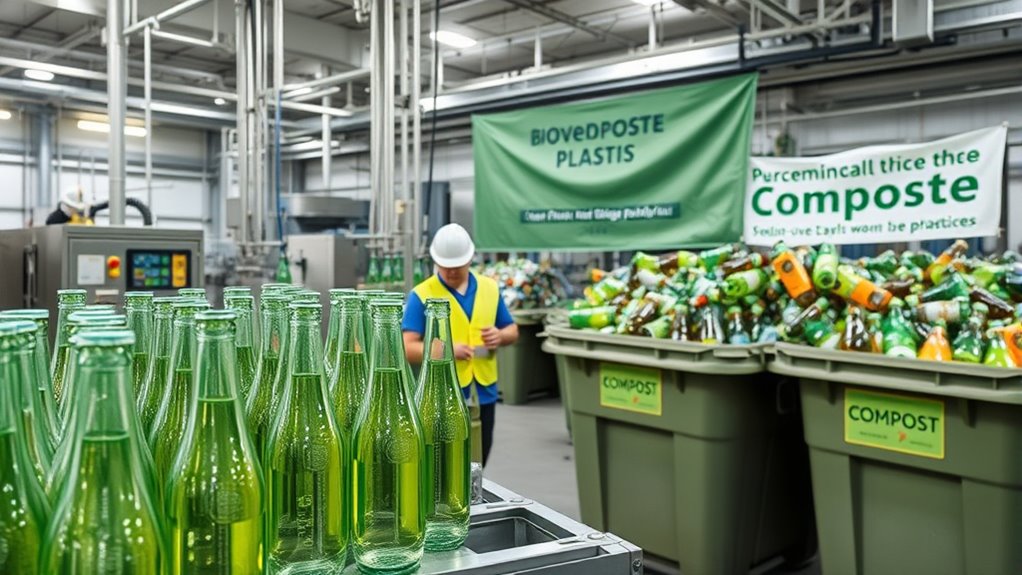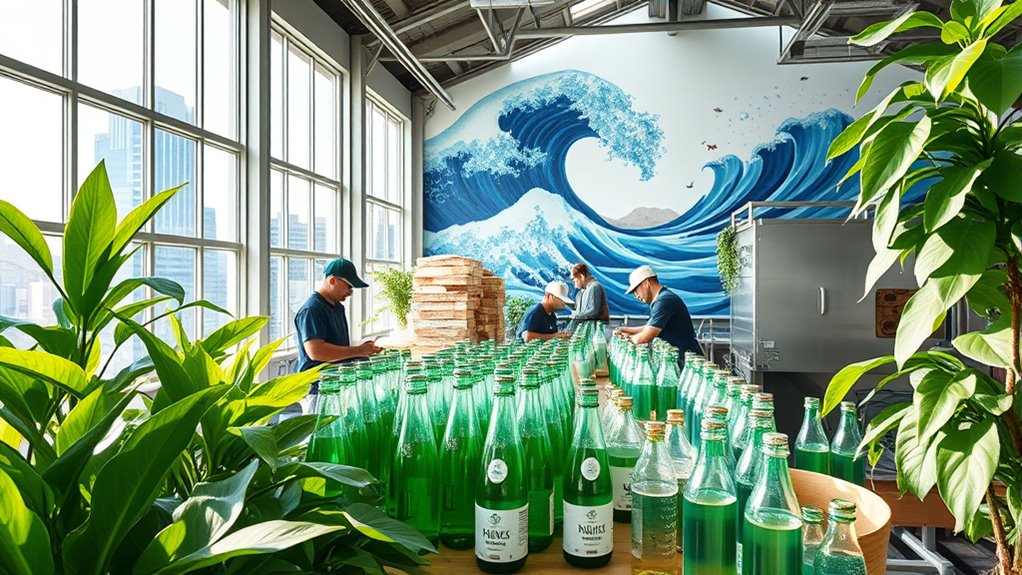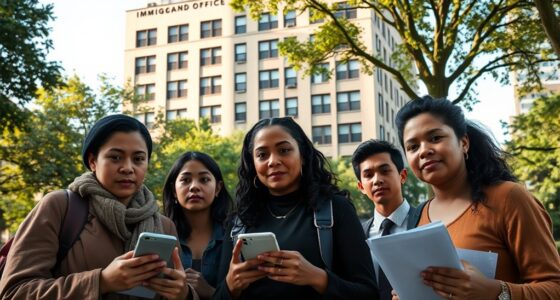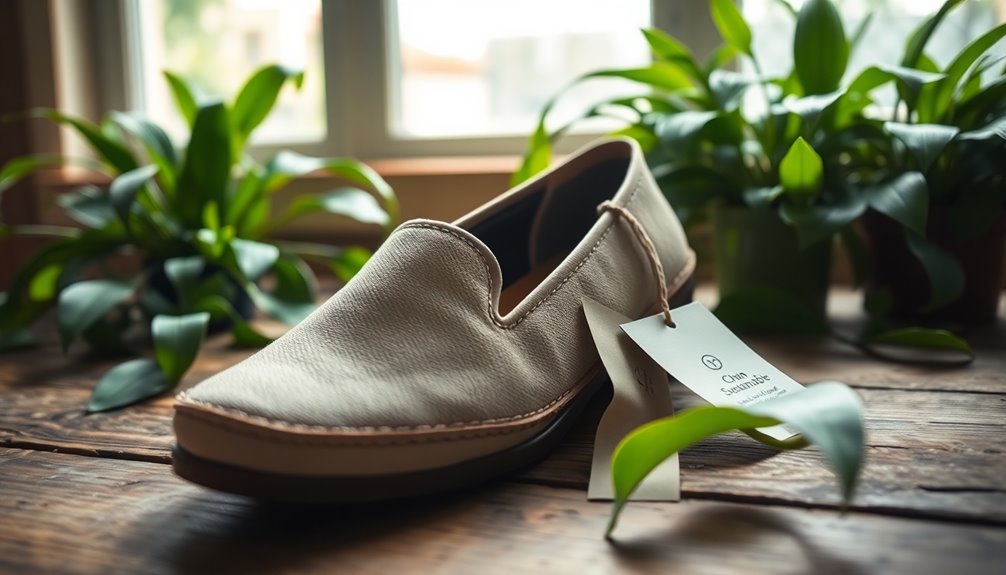The beverage industry is actively reducing single-use plastics by promoting recycling, redesigning packaging for easier reuse, and exploring biodegradable options. Companies are encouraging consumers to participate in recycling efforts and offering incentives for reusable containers. Industry initiatives also include transparency campaigns to raise awareness and push for stronger waste management policies. If you want to learn how these efforts are making a difference, keep exploring the innovative ways the industry is adapting.
Key Takeaways
- The beverage industry is adopting recyclable and biodegradable packaging to reduce environmental impact.
- Companies are implementing recycling initiatives and encouraging consumers to recycle properly.
- Brands are introducing reusable containers and incentivizing their use to promote sustainability.
- Packaging innovations focus on design improvements for easier recycling and increased use of recycled materials.
- Industry advocacy and consumer education efforts are driving policy changes and fostering eco-conscious purchasing habits.

Single-use plastics have become one of the most pressing environmental challenges today, polluting oceans, harming wildlife, and contributing to long-lasting waste. As a consumer, you play a crucial role in this fight. The beverage industry is recognizing this urgency, and many companies are implementing recycling initiatives to reduce their environmental footprint. These programs encourage you to recycle bottles and containers properly, transforming what might seem like disposable waste into valuable resources. By participating actively in recycling initiatives, you help guarantee plastics are repurposed rather than ending up in landfills or the ocean. But recycling alone isn’t enough; consumer awareness is equally critical. When you understand the environmental impact of single-use plastics, you’re more likely to make conscious choices, like opting for reusable bottles or supporting brands that prioritize sustainability.
Consumers play a vital role in reducing plastic waste through recycling and choosing sustainable options.
Industry leaders are promoting transparency and education to boost consumer awareness. They’re launching campaigns that highlight the importance of reducing plastic waste and demonstrating how recycling can make a tangible difference. This effort aims to shift consumer behavior, encouraging you to think twice before reaching for a single-use bottle or cup. Awareness campaigns often include practical tips on how to reduce plastic consumption and explain the lifecycle of plastics, helping you see the broader impact of your choices. As a result, you’re empowered to make more sustainable decisions that align with environmental goals. Increasing color accuracy and contrast ratios in packaging visuals can also help consumers distinguish eco-friendly options more easily.
Many beverage companies are also innovating with packaging designs that are easier to recycle or are made from recycled materials themselves. Some brands are exploring biodegradable alternatives or offering incentives for customers who bring reusable containers. These initiatives not only reduce reliance on single-use plastics but also foster a culture of sustainability. Your participation in these programs can amplify their impact—using reusable bottles, returning empty containers for recycling, or choosing products with eco-friendly packaging sends a clear message to companies that consumers value environmental responsibility.
Furthermore, your voice matters in advocating for stronger policies and regulations on plastic waste. Supporting legislation that promotes recycling initiatives and responsible manufacturing pushes the industry toward more sustainable practices. The collective effort of consumers, driven by increased awareness, can influence companies to prioritize eco-friendly innovations and invest in sustainable packaging solutions.
Frequently Asked Questions
What Innovative Packaging Materials Are Being Developed to Replace Plastics?
You’ll discover that companies are developing innovative packaging materials like plant-based options and edible packaging. These eco-friendly solutions aim to replace traditional plastics, reducing environmental impact. Plant-based materials are biodegradable and sourced sustainably, while edible packaging offers a unique way to minimize waste by allowing consumers to eat or dissolve the packaging after use. These advancements help the beverage industry move toward more sustainable and responsible packaging practices.
How Are Consumers’ Preferences Influencing Industry Changes Toward Sustainable Packaging?
You influence industry changes through your consumer behavior, showing a strong preference for sustainable packaging. When you choose brands that prioritize eco-friendly options, it boosts their brand loyalty and encourages companies to innovate. Your demand for greener packaging solutions pushes the beverage industry to adopt more sustainable materials and practices, making a real impact. Your choices drive companies to prioritize environmental responsibility, shaping a future where sustainability and consumer preferences go hand in hand.
What Government Policies Support the Reduction of Single-Use Plastics in Beverages?
Ever wonder how policies shape sustainable changes? Governments support reducing single-use plastics through regulations like plastic bans, which prohibit certain disposable items. They also enforce producer responsibility laws, making manufacturers accountable for recycling and waste management. These policies push beverage companies to innovate with eco-friendly packaging. By implementing such measures, governments create a structured framework that encourages industry shifts towards sustainability and reduces environmental impact.
How Do Recycling Rates Impact the Beverage Industry’s Packaging Decisions?
Recycling rates directly influence your packaging choices because higher rates mean better recycling infrastructure and more consumer awareness. When recycling infrastructure improves, your industry can confidently use recyclable materials, knowing they’ll be properly processed. Increased consumer awareness also encourages you to choose sustainable options to meet demand. Conversely, low recycling rates make it harder to justify eco-friendly packaging, as it risks ending up in landfills. You adapt your strategies based on these factors to promote sustainability.
What Are the Long-Term Environmental Impacts of Biodegradable Beverage Packaging?
You might wonder about biodegradable beverage packaging‘s long-term environmental impacts. While it reduces marine pollution by breaking down more easily, challenges in biodegradation can still lead to environmental harm if not properly managed. Over time, this packaging can lessen landfill waste and decrease plastic pollution, but inconsistent biodegradation rates could cause lingering waste. Overall, it offers a promising solution, but addressing biodegradation challenges is essential for maximizing environmental benefits.
Conclusion
You’ve seen how the beverage industry is tackling single-use plastics with innovative solutions and sustainable practices. Did you know that globally, over 300 million tons of plastic are produced each year, with a significant portion ending up in oceans? By supporting brands that prioritize eco-friendly packaging, you can help reduce plastic waste and protect our environment. Every small action counts—together, we can make a real difference in the fight against plastic pollution.










